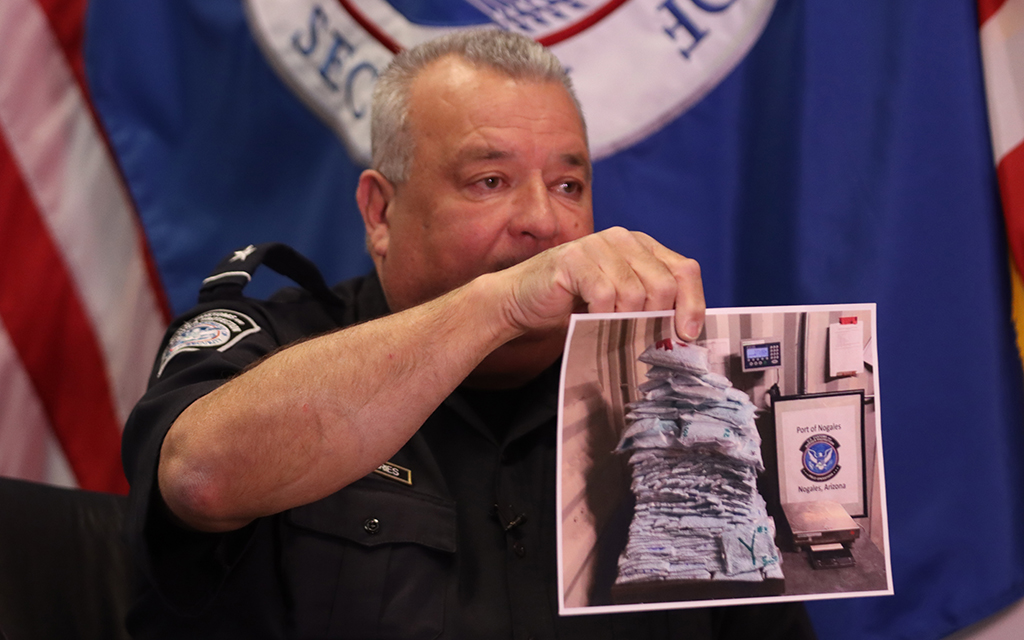PRESCOTT – Ashley Dunn loved to fish.
When she was 16, her father, Mitch Dunn, sneaked her and her family out onto the fifth hole of the south course at Antelope Hills Golf Courses to see if she could catch one of the carp swimming in the lake. She came away with a 3-pound goldfish that had been swimming in reclaimed water, but in photos, you would think she had caught a prize-winning marlin.
When Dunn was 26, she drove from Prescott to Black Canyon City to purchase what she believed to be oxycodone, but in reality, it was a fentanyl tablet.

Ashley Dunn holds her son, Carson, while accompanied by her mother, Josephine. Ashley died the day after Carson’s fifth birthday. (Photo courtesy of Josephine Dunn)
At 1 a.m. on May 24, 2021, Mitch Dunn took a call from Yavapai Regional Medical Center. It was a call he had feared would come. He knew Ashley used drugs and that there was either a call from a hospital or a jail cell in her future.
When Mitch and his wife, Josephine Dunn, arrived at the hospital, their worst fears were exceeded.
Ashley was on a ventilator. She had no brain activity. Her life was supported by too many wires to count. It was clear that this was not a question of if Ashley would make it, but how long it would be until they had to decide to take her off life support.
That decision was made two days later – one day after the fifth birthday of Ashley’s son, Carter.
Ashley Dunn died on May 26, 2021, at 3:22 p.m., becoming another victim of the fentanyl epidemic that has swept the nation.
Fentanyl has become the third wave of the opioid epidemic that has gripped the country since the 1990s. According to the Centers for Disease Control and Prevention, the synthetic wave of the opioid epidemic began in 2013 as synthetic opioid overdoses, primarily fentanyl, began to rise. Overdoses from the drug eclipsed overdoses from prescribed opioids and heroin in 2016 and have been on an upward trajectory since.
In 2021, the last year with complete data, 70,601 deaths from fentanyl and other synthetic opioids excluding methadone were recorded by the CDC. That’s more than seven times the number of heroin overdoses in the country in the same year.
Provisional CDC data for the 12 months ending September 2022 shows 106,840 predicted overdose deaths, of which 72,708 were attributed to synthetic opioids.
Fentanyl in Arizona
The Arizona border has become the nexus point for the trafficking of fentanyl into the country.
Approximately 22 million fentanyl-laced fake prescription pills were seized in Arizona in 2022, according to Drug Enforcement Administration Phoenix Field Division spokesperson Jodie Underwood. This accounts for more than 43% of the 50.6 million pills seized nationwide.
When it comes to bringing fentanyl into the country, nothing is sacred. Customs and Border Protection officers have found fentanyl in hollowed-out car batteries, hidden in fake coffee cans and stuffed in the backing of a framed painting of the Virgin Mary.

Michael Humphries, Customs and Border Protection area port director of the Port of Nogales, shows a photo on Jan. 26, 2023, of fentanyl seized at the port. (Photo by Logan Camden/Cronkite News)
Michael Humphries, CBP area port director in Nogales, said agents in the border town have seized more fentanyl in the first three months of fiscal 2022 than in all of fiscal 2021.
“Nogales is a fairly small town. So 10 or 15 million fentanyl pills over a few month period aren’t (just) coming to Nogales, to Tucson, to Phoenix. They’re going to spread across the U.S.,” Humphries said.
Josephine and Mitch Dunn recounted Ashley’s story in late January at Starting Point Church, a worship space that was once a Pier 1 Imports at the Prescott Gateway Mall. They’ve done it before, speaking at grief groups, in front of legislative committees and at community events. It never gets easier, though the pair have learned to cry less. In the quiet moments, Josephine has the look of a parent who knows the ultimate pain. It is not a thousand-yard stare, it is a stare into eternity.

Ashley Dunn poses for a photo. Dunn died at age 26 after taking a tablet that contained fentanyl. (Photo courtesy of Josephine Dunn)
Arizona Rep. Quang H. Nguyen, R-Prescott Valley, was in a parking lot on the Arizona Capitol grounds on May 25, 2021, when he picked up a call from Josephine Dunn. He couldn’t understand all her words through Dunn’s tears, but he knew there would be nothing more important on his desk that day.
“I get a friend calling me from Prescott and surprisingly she tells me that her daughter dies of fentanyl poisoning,” Nguyen said. “So I immediately canceled all my meetings for the morning and spent a couple of hours talking to her in my car.”
The “Ashley Dunn Act,” the short title for HB 2167, is the second bill Nguyen introduced in Ashley’s name. The bill seeks to make drug transfers or sales that result in the death of another person a class one felony, punishable by up to 25 years in prison.
Nguyen introduced a similar bill under the same title in 2022 that was modified to become what was introduced this year. It was held in the committee of the whole. Nguyen sees the fentanyl problem as a place for common ground.
“This issue to me should be a uniting issue that we all could agree that this is bad. We need to come up with a solution to penalize people who are peddling these pills and killing our young generation,” Nguyen said.
But at a House Judiciary Committee hearing on Feb. 1, Rep. Alexander Kolodin, R-Scottsdale, asked whether the bill was redundant with current manslaughter and drug trafficking laws.
In the same hearing, Pima County Attorney Laura Conover testified that Pima County prosecutors had success utilizing current law to prosecute cases.
“If you are in Pima County and you are selling a product that you know can be lethal and you are risking the death of your customers, we will put manslaughter charges against you,” Conover said. “I do believe that that has a deterrent effect.”

Josephine and Mitch Dunn talk about the death of their daughter, Ashley Dunn. (Photo by James Powel/Cronkite News)
The Judiciary Committee killed the bill Feb. 1 on a 2-5 vote, but it was revived eight days later in the Health and Human Services Committee, which gutted HB 2469 – a simple declaration of fentanyl as a public health crisis – and replaced it with the text of Ashley Dunn Act. It passed Health and Human Services Feb. 13 on a 6-3 committee vote, with Rep. Patricia Contreras, D-Phoenix, joining committee Republicans to approve the measure. It passed the Rules committee Tuesday, 5-3, and now heads to the House floor.
Across the mall, the Senate Judiciary Committee gave preliminary approval to SB 1029, which would amend the definition of first-degree murder to specifically include narcotics offenses that involve fentanyl.
For the Dunns, the setbacks in the House have not stopped their work spreading awareness on the fentanyl epidemic.
“I will never stop. Until I take my last breath. I will never stop trying to put fentanyl dealers in jail,” Josephine Dunn said.
“We don’t want any other family to have to go through what we have the past 20 months. My family is broken,” she said. “Thanksgiving is missing people at the table, Christmas there’s an empty chair. … I have four other children, and we’re not the same.”




